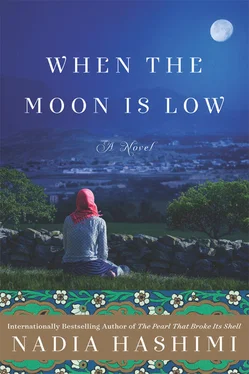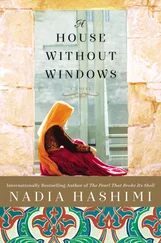“Samira! What happened? Where are you?” I strained my eyes to make out her shape.
“She fell, Madar,” Saleem said calmly. “I’m holding her hand.” Even as Samira’s ankle had turned in under her, he had held on.
Samira whimpered softly in the dark.
“Can you stand, my love?” I watched the distance between us and the others widen.
“Get her up and walking,” the driver hissed at us. “We cannot fall behind.”
I felt around for her ankle. My hand touched something wet and warm, and I realized she must have cut it against a rock. I prayed it was not too bad. I took a scarf from our bag of clothing and tied it around her ankle.
The driver’s light grew dimmer. My heart fluttered with alarm.
My daughter pressed on, though I could tell she was limping. Saleem did his best to support her weight, but he too needed to be careful with his footing.
God forgive me for putting them through this.
An hour later, the mother of the family ahead of us slipped, with her two-year-old in her arms. Their cries rang out in the night.
The flashlight turned on them. The mother’s face looked horrified.
“What have I done?” Her husband was at her side, helping her up. The baby’s arm had twisted grotesquely, bent between the elbow and wrist in an obvious break.
They were distraught. I wanted to help but didn’t know how.
The baby howled when his father tried to touch his arm. The driver stood over them, sighed heavily, and spit into the darkness.
“Look, there’s nothing you can do for him here. If you have something with sugar, give it to him. It might quiet him down. We must keep moving. He’ll fall asleep soon enough.”
THE BABY’S MOANS CARRIED ON INTO THE DAY. HIS MOTHER HELD him gingerly and did her best to keep his arm from jostling.
It was easier to walk in the day but harder to look at the children. Their eyes were heavy, their feet blistered and bleeding, and their lips parched.
We stopped only for a thirty-minute break — daylight would be upon us soon. I rationed out our food and gave the children a few bites of Raisa’s biscuits. I dripped water into Aziz’s mouth, but he was listless. I nursed him under my burqa . He suckled, but weakly.
Saleem and Samira curled up next to each other and fell asleep in seconds. Samira’s ankle was swollen and purple. Her small gash had started to scab. I ached to think how she’d kept up with us.
At dawn, Iran came into view. Waiting for us, at the foot of the trail and at the side of a small road, was a dark van. The driver motioned for us to follow as he jogged to the vehicle. He slid the door open and we piled in, the smell of stale sweat and acrid breath concentrating in the small space. I could see my hesitant relief mirrored in the faces around me. We’d made it this far but were still very close to the border. If the van were stopped, we might be sent back to the checkpoint and returned to Afghanistan.
Our guide sat by the van’s driver. The two spoke in low tones, pointing at the road ahead of them.
I watched the dusty landscape through the window. Though Iran had the same colors and smells of Afghanistan, it felt foreign and strange. We were far from home.
The little boy’s groans synchronized with Aziz’s. His crooked arm lay across his chest, swollen, contorted, and purple. His mother stared at it helplessly and wiped away tears. Her husband called out to the driver.
“Excuse me, friends, but we need to take my son to a doctor. His arm is in terrible condition and he’s in much pain.”
“The contacts at your destination will help you find a doctor.”
“But, please, it’s been broken for so long. It’s getting worse every minute.”
“I don’t know where the doctors are and you are in this country illegally, in case you have forgotten. If you want to be safe, you will wait until your contacts can take him somewhere.”
Luckily, Samira’s ankle had not gotten much worse. It was still swollen, but the gash was healing. Aziz was a bigger concern, lacking the energy to fuss.
The open landscape gave way to buildings and a grid of roads. The smugglers dropped us off at an apartment building in Tayyebat, a border town. It was a four-story building with cloudy windows that overlooked the street.
“Take off those burqas . Wear these.” The driver tossed two black cloaks into the back of the van so we could better blend in with the Iranian women.
We were sent to an apartment on the second floor. The other family headed up to the third floor.
“May God be with you,” I said as we parted ways. “I’ll pray for your little boy’s arm to heal quickly.”
“And may God be with you too, my brave sister,” came the mother’s broken voice. “Allah keep you all healthy and safe in this journey.”
The trip from Afghanistan to Iran had been a largely silent one. It was not a time for making friends. I did not have enough for my own children and could not afford to befriend a stranger who might take any little bit of what we had.
The door opened and a woman ushered us into the two-room apartment. I was grateful for shelter. This was one way for sympathetic Iranians to house Afghan refugees and earn some money in the meantime. I was much more at ease around this strange woman than the shifty men who’d gotten us here. She fed us a simple feast of bread and yogurt. We slept soundly for the first time in days.
After one night, we were put on a local bus and sent to a similar apartment in Mashhad, a bigger city where we would be staying until we were ready for the next leg of our journey. Our time in Mashhad was relatively easy. We were hosted by another Afghan family who had fled Kabul a few months earlier. They had crossed the same treacherous desert trail and narrowly escaped capture once they entered Iran. They were living as refugees now with modest means but generous spirits.
In exchange for a small sum, we were given a room and a place to take a warm bath. The children were fed and Samira’s ankle returned to a proper size and color. Aziz cooed contentedly — a most inspirational sound. We were restored.
Iran had opened its doors and accepted hordes of Afghans as refugees. Countless others lived there illegally. But Iran was never in the plan Mahmood and I had devised. Many Afghans complained of being treated poorly, and opportunities were scarce. If I wanted to give my children a real chance, we needed to continue. The longer we waited, the heavier our feet would become.
WITHIN A MONTH, I’D PLANNED OUR ROUTE TO TURKEY. I BOOKED bus tickets to Tehran, the country’s capital. In my flowing black burqa, my tired children in tow, we blended in with Iran’s peasant class, migrating across the country in search of a better life.
From Tehran, we caught another bus and traveled across the border into Turkey, this time using the passports Abdul Rahim had secured for us. The customs officer stared at me and my passport picture, stamped it, and handed it back with an uninvited caress on my wrist that I ignored in light of our falsified visas.
We’d put one more border behind us — one more buffer between us and the life we’d left behind. Turkey looked less like Afghanistan than Iran had. The language, the earth, the food — everything was one degree more foreign. On reconsideration, it was we who were foreign. We were drifting into lands where we were not welcome and scared every step of the way that we would be sent home, a fate I could not bear to consider.
I was leading my children into an unknown world, and whatever happened to us, to them, was my responsibility. It would have been easier to close my eyes and disappear, to not be responsible for their next meal or keeping them safe while we trespassed borders. But these lives depended on me, even Saleem who could brood like a grown man and questioned the choices I made. The shadow of hair on his upper lip, the way he shouldered our bags, the wristwatch he coveted — Saleem believed he was a man. As much as I needed him to be just that, I was also afraid for him. The person most likely to drown in the river is the one who believes he can swim.
Читать дальше












